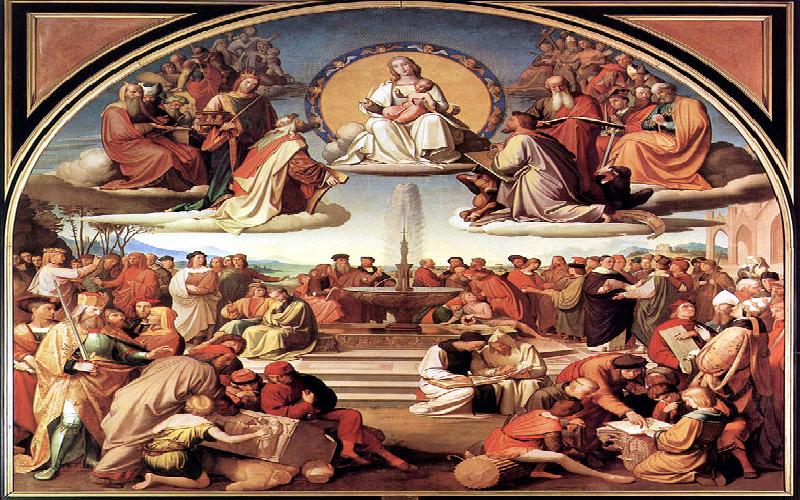“Religion” and “dharma” are often considered as meaning the same thing in different languages … as if one is the translation of the other. However, while these two concepts may have many similarities, they are not the same thing, with very fundamental differences in their origin, evolution and application. Religion is a centered around unflinching loyalty to certain rigid beliefs in divine dictates, whereas dharma is centered on the human conduct in real and day to day life. Religion invariably leads to communities, often closed ones; dharma does not even conceptualize a community. Religion is rigid, bound by what was written long ago; dharma depends upon conscious judgment and has the flexibility of adopting to different contexts…
Religious Philosophies & their Evolution
The religious philosophies have evolved as part and parcel of human civilization. The various philosophies that evolved in different parts of the world and at different points of time had their own peculiar characteristics that differentiated one from another. They are spread across a wide spectrum, ranging from the primitive beliefs about the supernatural in pre-civilized societies, almost bordering on superstitions, to elaborate abstract visions of the universe, often with focus on the conduct of man and an intent to strengthen the moral values of the society.
These philosophies, one must add, are not always based on logic and rationality. In fact, almost invariably, it is the component of faith – a set of beliefs – sometimes without any obvious evidence or rationality, and at times, largely in contrast with our scientific knowledge, that dominates over the rational component of such belief, even where it exists.
The Contrast between the East & the West
The religious philosophies that evolved in the ancient Eastern civilizations of India and China have many significant differences from the way religious philosophies evolved in the Western hemisphere. While they share a number of common features, such as the emphasis on pure conduct, faith in an omnipotent supernatural almighty Lord of universe, role of prayer and a set of rules, there are significant differences between them. Some of these differences are qualitative in nature, that make the concept of “religion” and the concept of “dharma” virtually two different commodities. There are other differences between them that are actually quantitative, with different level of emphasis placed on aspects that are common to both.
The contrast begins with the way these religious philosophies are identified. In the East, they are generally called “DHARMA”. In the West, they are usually referred to as “RELIGION”. Thanks to the Colonial era, the globalization and the linguo-cultural fusion during the last couple of centuries, people have begun to perceive the two as the same thing – one being the translation of the other. However, that is not a correct perception, for these two concepts represent two very different streams of philosophies, with different origins, evolutions and characteristics. More importantly, the social values that they accord precedence are very different.
DHARMA – The Religious Philosophy of the East
“Dharma” is a Sanskrit word that originated with the evolution of Indian civilization somewhere between Central Asia and China. Its literal meaning is “duty”. What it denotes is the duty of an individual. This sense of duty was based on a very large number of factors that include the beliefs of the society about their origin, about the way universe is organized, about the existence of supernatural powers and about human relations that form the core fabric of their society. The same word in Prakrit, which was the language of the common people, becomes “Dhamma”. It is this word that echoes through all religious philosophies of the East, from the so called Hinduism to Buddhism, and even Confucianism and Taoism. Their most important salient characteristic is the overwhelming precedence given to the actual conduct of the individual, compared to what that individual believes or has faith in. In other words, what matters most is not the faith or beliefs of the individual, but his or her actual conduct in real life viz a viz other human beings and nature. A more accurate term for what is often referred as Hinduism is “Sanatan Dharma”, which means “eternal duties” that are supposed to guide every human individual, irrespective of his or her antecedents.
This emphasis on conduct rather than faith has several connotations that become apparent at every aspect in which Dharma contrasts with religion. First, it allows and tolerates differences in faith. It begins with an acceptance of ignorance, treating the almighty God as an entity which is beyond the human comprehension. Consequently, it advises people to seek enlightenment, by following those who have already attained it. The Eastern philosophies place huge emphasis on the role of the “GURU”, the master or the teacher, and advocates full obedience, almost bordering on a subservient existence of the disciple. It admits the human limitation of a teacher’s following and accepts the possible differences in perception of different Gurus, without being offended by it. Which Guru a person follows is irrelevant till the time following that Guru helps the follower in correctly identifying his duty and fulfilling it.
Thus, in all Eastern religious philosophies, whether it is Hinduism, Buddhism, Confucianism, Taoism, Jainism or Sikhism, there are often sects, or schools of philosophy that somewhat differ from each other. In ancient times, there used to be structured debates, referred to as “SHASTRARTHA” (interpretation of the texts) between these schools. Whenever, the followers of a particular school became a large mass, they came to be identified as a religious community. Jainism, Buddhism and Sikhism originated in exactly this way. Buddhism came to be called Chang in China and Zen in Japan the same way. The importance given to the Buddhist masters in China, Japan, Thailand and other Asian countries has been the subject of many fables, tales, legends and movies. Reverence for the master or the guru is a part and parcel of this tradition.
In all these religious philosophies, the followers refer to the texts, ancient as well as later ones, and use them to identify their duties. But the emphasis is on conduct, not the text that one follows. There is also the concept of “Satsang”, or “company of learned ones” as that is what is supposed to be the best learning for a person. Buddhist monasteries across the world are also based on this very principle. In Zen, the conduct assumes absolute importance, while words are reduced to triviality. Articulation and interpretation are almost relegated to the background.
Another important aspect of these philosophies is that they begin by accepting their limitation in perceiving god. While accepting that god is omnipotent, omnipresent and omniscient, it leaves it to the individual to perceive him either as an abstract (“NIRAKAR” – without shape or features and unperceivable by mankind) or in a perceivable form (“SAAKAAR” – as an identifiable and perceivable entity). The acceptance of such ignorance means that beliefs about god can be different and those differences are tolerated, provided that they lead the individual to the same Dharma or Duty, which he is supposed to follow.
This is how in Eastern religious philosophies, what you believe is considered an option, and differences therein held tolerable. But when it comes to conduct or Dharma, the duties must be followed. The son is supposed to follow his duty (santan-dharma), and father is supposed to follow his duty (pita-dharma). Thus, a man can have different dharmas at the same time. The duties of the King and the duties of a trader are recognized as different, so the dharma of a king (Raj-dharma) is different than that of a merchant. The duties of a soldier being different than that of an ascetic intellectual, their dharma are not the same either. One man can have different sets of duties in different capacities, the collective of which will constitute his ‘dharma’. If he falters in following his ‘dharma’, he would be looked down upon, irrespective of his faith and beliefs.
RELIGION – Religious Philosophy of the West
Several dictionaries define ‘religion’ as “belief in and worship of a supernatural controlling power, especially a personal god or gods”. Historically, the West had two main schools of religious philosophies. The first one was that of pre-Christian era. If one takes the religious philosophies of the Romans and Greeks, they were very different from the way religion came to be interpreted with the advent of Christianity and Islam. In many ways, the pre-Christian religious philosophies are more fluid, not based on any single text and place a far lesser emphasis on communal consolidation.
The modern meaning and interpretation of the word ‘Religion’ is in many ways an extension of the religious philosophies of Christianity and Islam. In fact, it is the common characteristics that they share, which have largely come to be identified as the meaning of religion, and logically so, as together, Christianity and Islam are by far, the most popular and all pervading religious philosophies around the world, particularly after the dominance of Ottoman Empire for many centuries and the recent Colonial era. With 3.2 billion followers, these two religious philosophies have dominated the global religious canvass during the last millennia, which, by the way also coincided with the relatively
dark ages that resulted from internal civilizational decay, external attacks, invasion and plunder in the Eastern societies during the same thousand years.What characterizes a particular “religion” is its conceptualization and belief about the dominating supernatural power of this universe. The single characterizing feature of Christianity and Islam is their belief in one God, something that was in great contrast to many tribal, pagan, Shamanic and other polytheistic religions were earlier prevalent in the territories where they originated. The abhorrence of Christianity and Islam for idol worship appears to have been inherited from their struggle from those days, when it had to literally compete with them for survival. In fact, Western religions derive their legitimacy from the invocation of divinity in their origin, with Christ being the son of the God and Mohammad being his last authentic messenger. Any doubts about the authority of the divine would cast a question on the legitimacy of the religion itself, and is therefore considered blasphemy, the biggest crime of a man!
Compared to the strict adherence for the unquestionable authority of the holy divine in Western religions, the philosophies of the East provide interesting contrasts. Buddha almost negated the existence of God, even though after his death, his followers in Hinduism and Buddhism, elevated him to the status of God or its incarnation. Interestingly, ancient Romans, Greeks, Indians, Egyptians and Persians, all revered the powers of nature that helped in sustenance of life, like the Sun, which was often treated as a divine entity, but such conceptualization of God or Gods was never the main characterizing feature of their religious philosophies.
Both Christianity and Islam are based on a certain pieces of written text, which is believed to represent the final truth for its followers. A follower of these religions must fully believe and have faith in it. Not having faith in even one of the aspects dealt there could lead to charge of blasphemy. This does not mean that everyone necessarily interprets each and every word therein in exactly the same way. There can be different schools of interpretation. The way Wahabis interpret Islam can be totally at odds with how Sufi scholars might be doing it, but there is one aspect common to both. They both explicitly express extreme and unconditional allegiance to every word that is written in the Holy book. The same is also true of Christianity. Catholics or Protestants, they may agree or not agree on the authority of the Church, but they would all still follow the Holy book. While Catholics do place some importance on righteous conduct, the protestants negate even that, with belief in Christ being the first and final atonement of all their sins.
Another aspect that characterizes religion, is the higher significance placed on faith than conduct. A person may not conduct himself as per the norms of a Christian or an Islamic society, but to the extent, he has full allegiance in the religion, he is acceptable. Simply put, in religion, the first and the final duty is to believe in the religion. Everything else is secondary, or even irrelevant.
Religion and Dharma – Two Distinct Entities
The relative lack of tolerance to differences in faith and belief might be the reason why religions lead to far greater communal consolidation. Christians and Muslims across the world also have a duty to convert non-believers and bring them within their own community. This is one of the primary reasons for the expansion of these religions during the last few centuries. Contrast this with Eastern philosophies of Dharma, which place very little emphasis on this as a fundamental duty of its followers. In fact, the oldest of them all, Hinduism does not even conceptualize “conversion” of an individual to Hinduism, since the duties that the philosophy suggests are supposed to guide the conduct of each and every individual, irrespective of what other beliefs he or she may harbor. The absence of a way of getting others converted into Hinduism, indicates a very fundamental difference in their communal aspirations. This difference is significant, because where communal aspirations dominate, as in the case of Western religions, the allegiance to religion takes precedence over the actual conduct of the person, thereby creating huge political favors for those who follow the same religion as that of the King or those in power. This also introduces a political component in religion.
In Islam, this has even led to religious violence within the followers of Islam. Wahabis do not tolerate the existence of any other sect. Ahmadiyyas, Sufis and Shias have been their constant targets. Not only men and women, even the shrines and places of worship of other Muslim sects are not spared by the Wahabis, and these are not the tales of a long past medieval era. This is an approach, a reality in the twenty first century, which has the support of millions …. in the name of religion, of course !
As one can see, religion is not the same as Dharma. The two are very distinct concepts, though they do have certain similarities. It is unfortunate that this distinction is not easily appreciated.
An illuminating illustration of how dharma allowed flexibility of allegiance to different philosophies can be found in the preferences of rulers of the Mauryan Empire in India, the first great Indian empire that is recorded in history that existed between the times of Buddha and the Christ. Chandragupta Maurya, who created this empire, was a follower of Hindusim, but embraced Jainism, based on the teachings of 24 “Tirthankars” or “role models”, in the later part of his life. His son, Bindusar was initially a follower of Vedic sect (what is called Hinduism today) but later began to follow the Ajivik- an ascetic sect of those times. His son was Emperor Ashok, who is considered one of the greatest among ancient Indian rulers, was not very religious in his early life, but later adopted Buddhism because of its appeal for non-violence, and spread it all around the world. The city of Osaka in Japan is named after him. It is impossible to find such an example in any of the dynasties that have ever followed the Western religions. In fact, in most of them, even an attempt to change religion would have resulted in political havoc for the king and his family. Nothing of the kind happened in the family of Ashok, because the philosophy of Dharma is focused primarily on the duties of the individual, and not his allegiance with a particular school of religious philosophy.
This difference between religion and Dharma is also very well epitomized by the words of Vivekanand, a revered Hindu philosopher in nineteenth century, who said,
“…We not only tolerate, but we Hindus accept every religion, praying in the mosque of the Mohammedans, worshipping before the fire of the Zoroastrians, and kneeling before the cross of the Christians, knowing that all the religions, from the lowest fetishism to the highest absolutism, mean so many attempts of the human soul to grasp and realise the infinite, each determined by the conditions of its birth and association, and each of them marking a stage of progress. We gather all these flowers and bind them with the twine of love, making a wonderful bouquet of worship.” (Swami Vivekananda; Complete Works, I-331).
Such a statement by a Christian or a Muslim peacher may have led to charges of blasphemy. Vivekanand, on the contrary, is considered a great soul by Hindus for having said it. Actually, what Vivekanand said is not very different from what Victor Hugo also wrote once,
“Whenever we encounter the Infinite in man, however imperfectly understood, we treat it with respect. Whether in the synagogue, the mosque, the pagoda, or the wigwam, there is a hideous aspect which we execrate and a sublime aspect which we venerate. So great a subject for spiritual contemplation, such measureless dreaming -- the echo of God on the human wall!”.
Religions do not often talk in that tone. Dharma does, unless of course, it has also become a religion ! …. and it may, unless we understand and appreciate the difference between the two !!












